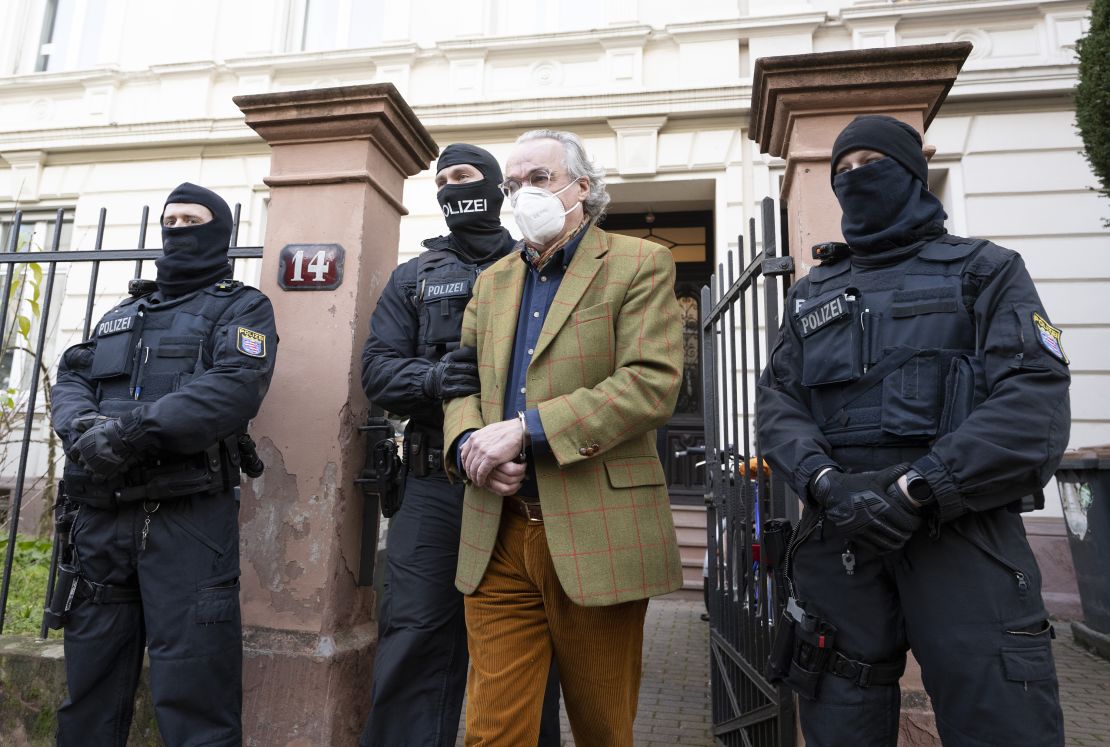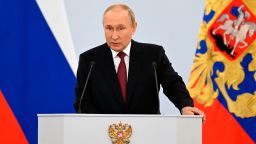Editor’s Note: Thomas Weber is Professor of History and International Affairs at the University of Aberdeen, and a Visiting Fellow of the Hoover Institution at Stanford University. Follow him on Twitter at @thomas__weber. The views expressed in this commentary are their own. Read more opinion on CNN.
Until last week, hardly anyone had heard of Heinrich XIII Prince Reuss, the 71-year-old descendant of a minor German princely family. Even his family had reportedly ostracized him years ago for his extreme views.
Yet for the Reichsbürger movement – the political group behind what prosecutors recently described as a thwarted plot to overthrow German democracy – Heinrich XIII was exactly the man, or rather the prince, they needed.
Absurdly, the Reichsbürger believe that Imperial Germany, which came crashing down a century ago, must be re-established for Germany to rise from the ashes again.
But for that to happen, they need a real prince – which turned Heinrich XIII into a godsend for them. (The prince has not publicly commented on his arrest).

As outlined in government documents, the fantastical plot, involving an ageing aristocrat and a cache of weapons, has been linked to a ragtag of arrested suspects. Among them, “Frank H.,” widely named by the media as celebrity chef Frank Heppner, whose daughter happens to be the partner of Real Madrid soccer star David Alaba.
There has been no official comment from Heppner. His restaurant is currently taking a “creative break,” according to its website.
Heppner honed his signature dishes during years spent in Asia before returning to Europe. Had last week’s plot succeeded, the new government might have lived on a staple diet of high-end Euro-Asian fusion cuisine, rather than German Wurst.
At the very least, Germany’s new would-be leader would have eaten like a king while re-establishing the monarchy.
A Patriotic Union
Even assuming the prosecution’s narrative, Heinrich XIII realistically was never going to succeed in overthrowing the German government, and it is tempting to dismiss him and his alleged co-conspirators as mere fantasists.
Hardly any German wakes up in the morning, wondering if turning the country back into a monarchy would help address their daily challenges.
It also quickly became clear that most initial comparisons in the international media to the January 6 insurrection in the United States were a stretch. For the Prince Heinrich plot lacked support from mainstream German politicians.
Yet the real threat to democracy isn’t simply about the success of this particular plot. Instead, the incident points to a more immediate threat – a looming wave of radicalization in Germany and around world.
Even though media attention has mostly focused on Reichsbürger thinking, the group of plotters allegedly go by the name “Patriotische Union” (Patriotic Union).
What unites the estimated more than 50 members of the “Patriotische Union” is mostly what they stand against. In addition to Reichsbürger, they include members linked to the anti-vaccination Covid-19 movement Querdenker; conspiracy theorists aligned with Qanon; at least one member of the far-right Alternative for Germany (AfD) party and supporters of Die Basis, a fringe party committed to supposedly returning democracy to Germany. In short, extreme groups with sometimes conflicting goals.
Yet the Patriotische Union plotters are willing to put their differences aside to come together under one banner, and embrace Heinrich XIII. They do so because they have one overriding concern in common.
They believe that Germany is living in a world of existential crisis, which existing governments are supposedly incapable of tackling. What is at play in them is a nexus between crisis perception and catastrophic political radicalization.
For that reason, the thwarted plot points to a much graver threat to our world than the one emanating from classic Reichsbürger thinking. For the same nexus was at play when democracy collapsed in interwar Europe.
The plotters and ‘crisis perception’
Indeed crisis perception is the prime moving force behind the radicalization of several of the plot’s alleged key members, including some former paratrooper officers.
One of those arrested in connection with the plot is “Maximilian E.,” reportedly former army colonel Maximilian Eder. In his self-published book, Eder lays out over 179 pages how the 2021 floodings in Germany escalated into a crisis only due to a failure of political leadership – necessitating “freedom fighters” like him to step in. Eder has not commented on the arrest.
Another arrested suspect in the military arm, “Peter W.,” named in the media as Peter Wörner, offers courses in the wilderness in “crisis preparedness in Germany and Europe” and “crisis prevention,” according to his website. He teaches survival during times of “system crash/financial collapse/economic collapse.” Wörner also has not commented on the arrest.
And then there is arrested suspect “Michael F.,” reportedly Michael Fritsch, formerly a leading politician of Die Basis who ran for German parliament in 2021. Die Basis has a far wider support base than the Reichsbürger movement, scoring more than 735,000 votes in the 2021 elections.
The party was founded in response to the Covid-19 pandemic, in the belief that the real crisis was human – or rather, government – made. The party falsely charges government with having cut the lives of every German short by up to ten years; presented literally as an existential life-or-death crisis.
Lessons from the Second World War
But there is also cause for much greater concern. In a speech delivered in Switzerland, Heinrich XIII searched for the reason as to why Germany is in crisis and, in doing so, he falsely identified the power of supposedly Jewish finance capitalism as the root cause of all of Germany’s problems. Clearly, harking back to themes of the Nazis.
The behavior and radicalization of the conspirators arrested in Germany is a function of a well-known phenomenon: that in times in which the perception of the existence of an all-encompassing existential do-or-die polycrisis is taking hold, including but not limited to interwar Europe, people turn against those in the driver’s seat of politics and are receptive to conspiratorial thinking.
In short, it is then that the conditions are rife for catastrophic political collapse and radicalization.
The Reichsbürger movement now is also a home to seriously alienated people, who feel, because of the perception of living in a permanent state of crisis, liberal democracy has lost credibility and they hence turn toward authoritarianism and the politics of coups.
Furthermore, Western governments have inadvertently helped to fan the fire of radicalization in times of crisis. Over the last generation, governments have started to present every crisis and potential crisis as a solvable policy challenge.
For instance, when the Netherlands passed their first National Security Strategy in 2005, they went for an “all-hazard approach,” aimed at preventing, solving or mitigating disasters and crisis of all kinds. New agencies were set up, legislation passed, and government presented itself as a crisis prevention manager.
But in doing so, Western governments have created expectations amongst the electorate to which they cannot possibly live up to. As crises happened anyway, citizens started to see governments as crisis creators. All this has unwittingly played into the populist playbook that the political establishment has been letting the people down and that radical new answers and personnel are needed to produce deliverance from a world of existential crisis.
Get our free weekly newsletter
- Sign up for CNN Opinion’s newsletter.
- Join us on Twitter and Facebook
The thwarted plot should thus be understood as the canary in the coal mine as to what there is to come, not just in Germany but around the world, unless we all find ways urgently of addressing the mushrooming polycrisis perception across much of the world.
According to a proverbial Chinese saying, in every crisis, there is opportunity. But as history teaches us, in every polycrisis, there is political catastrophe.





